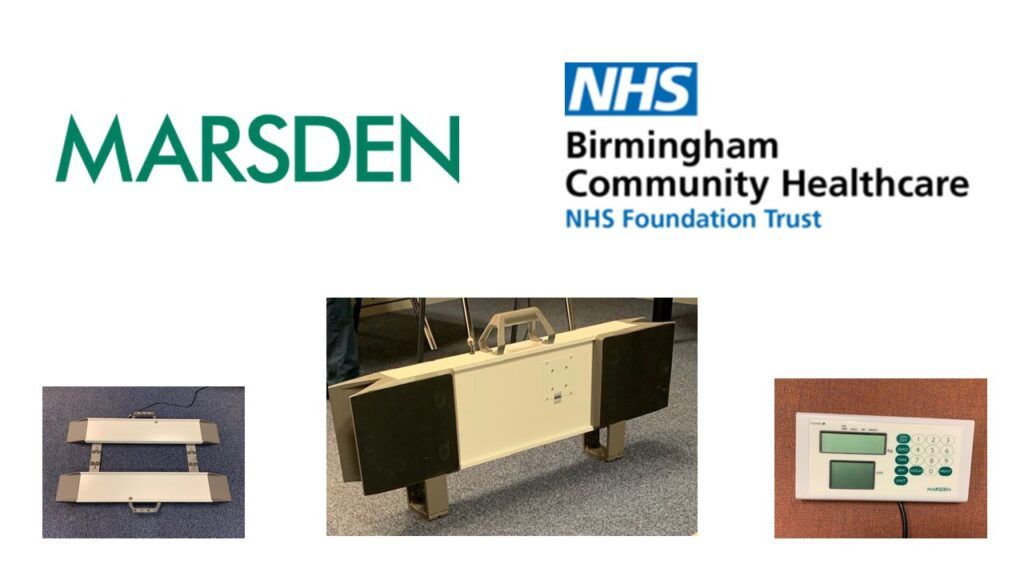Community Weighing Scales:
The Community Weighing Scales were developed in partnership with Birmingham Community Healthcare NHS Foundation Trust and a leading firm for medical weighing equipment manufacturers called Marsden. Sue Meredith Clinical Lead for Pediatric Dietetics and Enteral Feeding within Birmingham Community Healthcare NHS Foundation Trust identified issues with the existing weighing scales that were being used by community dietitians that provide nutritional care and assessments in patients’ homes.
Many of the staff were reluctant to use the existing weighing scales due to the size and weight of the scales (around 18kg). This caused staff to have concerns around their own health. Staff had to transport the wheelchair scales to and from their car to the patient’s home, sometimes this would mean carrying them up flights of stairs. As the wheelchair scales were heavy, and bulky many staff members felt would increase their own risk of injury. In addition, some staff were unable to fit the scales in their cars, and there was a risk of damaging patient’s homes due the length of the beams.
This meant that routine nutritional screening was not being completed for nutritionally vulnerable patients in their homes, as many staff members could not carry the weighing scales, and some were reluctant to because of the injury it could cause them. Often staff would have to do home visits in twos to complete the nutritional screening as the weighing scales were too heavy to carry for one person alone. If weighing patients was not complete, it meant that it was difficult to give patient’s feedback on their progress, especially for patients that were unable to communicate with staff if they were hungry or thirsty.
With these issues identified the Trust began working with Marsden, with MidTECH making initial contact with them, arranging discussions and it was agreed that Marsden and the Trust would work together to create and manufacture a weighing scale for wheelchairs that were easier to transport, lighter, simpler to use and ideal to be used by community dietitians and health nurses. The wheelchair weighing scales that were produced are suitable for almost any wheelchair.
The weighing scale consists of two lightweight beams and an indicator to read the weight of the patient. Each beam is connected by a series of hinges and has a built-in handle to make it easy to transport. A carry case for the weighing scales also comes with wheels so that the weighing scales are easier to transport. The scales come with an internal rechargeable battery and the weight of the new scales is 9.8kg which is nearly half the weight of the previous scales.
Additional Features:
- Class III Approved
- Full numeric keypad to measure BMI in seconds
- Lightweight and portable, ideal for the community
- Easy to use – set up in minutes
- Tare/Pre-set Tare and Hold functions
- Auto power-off after 3 minutes
- Gentle incline ramps
How to use the weighing scales?
When it comes to weighing a patient, the weighing scales case is placed on the floor and the latch is opened. Once the latch is opened the beams can then be unfolded onto the floor. The scales need to be switched on before the patient is weighted on their wheelchair. The weight of the wheelchair can be removed meaning that only the patients weight it displayed on the indicator. The patient’s height can also be entered meaning that the scales can also calculate the BMI of the patient.
How did MidTECH Help?
MidTECH Innovations helped with commercial discussions, negotiations, and contractual aspects of the project. Following the initial meeting with Birmingham Community Healthcare NHS Foundation Trust the MidTECH team undertook an initial assessment of the innovation. The MidTECH team investigated the intellectual property that was needed to move the project forward, the workability of the innovation and looked for routes to commercialise the project.
MidTECH found Marsden so that the idea could be commercialised and co- developed with the Trust. MidTECH ensured that Birmingham Community Healthcare NHS Foundation Trust benefited from the project in terms of recognition and free units of the scales.
Quotes:
Sue Meredith, clinical lead for paediatric dietetics and enteral feeding said:
“Community dietitians are providing nutritional care and assessment in people’s homes where sometimes space or access may be quite limited.
“Everyone who has had to use the existing equipment says it’s too bulky. Some staff have assessed it is too heavy to carry themselves, therefore patients weren’t getting the level of assessment we would expect as routine. So, having identified the issue, we approached the research and innovation team to ask about developing some smaller and lighter scales.”
Innovation facilitator Nazneen Bagdadi explained that her team supported the dietitians by looking for suitable expertise with whom to partner through MidTECH, the NHS innovation hub for the West Midlands which is part of the West Midlands Academic Health Science Network. “That search produced three possible partners and, after meeting all three, we were very pleased to choose Marsden as the best partner for this project.”
Innovation manager Hamid Zolfagharinia said, “this is a prime example of clinically driven innovation and multiple stakeholder engagement to go from an identified challenge in healthcare delivery to an innovative technological solution to become available in the market.”
For more information:
https://www.bhamcommunity.nhs.uk/about-us/news/latest-news/weighing-scales-innovation/

